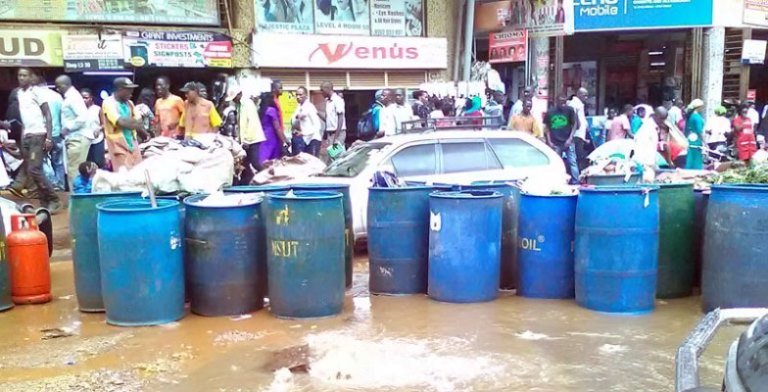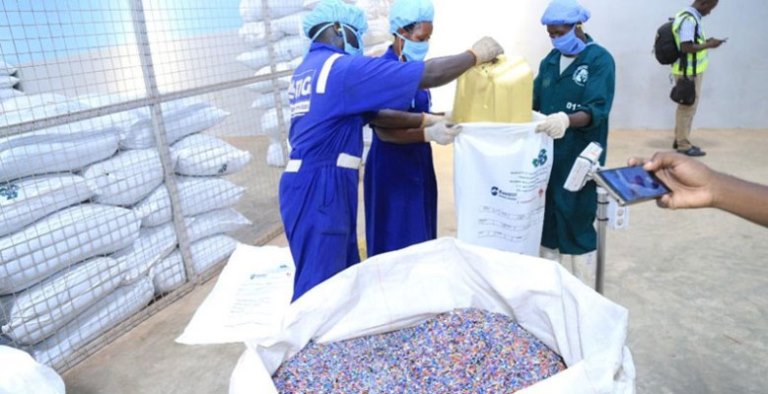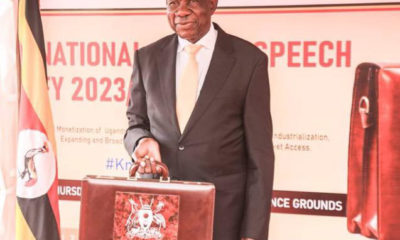Health
Kampala’s garbage crisis;

Hard plastics can also be recycled
Cabinet last week resolved to extend the contracts of three private garbage collection companies in Kampala for another one year. But a number of stakeholders including city traders, community members say the one-year extension will only prolong the crisis that is characterised with exploitation by the private garbage collectors and worsen the deeper environmental and health effects of garbage especially among the urban poor.
In most cities, if not all, the responsibility of garbage collection and management falls primarily in the hands of the of the city or municipal authorities. In Kampala, this responsibility was however tendered out to three private companies; Nabugabo Updeal Joint Venture, Homekline and Kampala Waste Management Co. Ltd.
Kampala Capital City Authority (KCCA), the administrative organ of Kampala city, spends more than UGX8.5 billion to pay the private companies to collect garbage across the city and also finance its own garbage collection operations. The private companies however consider this as a small token or top-up that cannot facilitate free garbage collection. As a result, the companies charge different fares to collect garbage from the generators of trash i.e shop owners, household members and landlords.
But one councillor from a predominantly poor neighbourhood or Kalerwe argues that the private companies collect a small fraction of the garbage which they find on the main roads and leave the bulk of the trash in communities.
Councillor Leonard Ssekamatte of Mulago II which has 11 villages surrounding Mulago hospital, argues that in his constituency, landlords and business owners along the main roads stop people from collecting garbage near the road where the trucks can easily find it, and when the trucks come, the private collectors prevent community members from bringing the garbage to be taken away, simply because they cannot afford to pay the charges.
Councillor Ssekamatte traces the root causes of the garbage crisis to the failure by the government to prioritise sanitation when it abandoned the enormous responsibility in the hands of ill-equipped, largely unsupervised private garbage collection companies.
Ssekamatte argues that whereas the KCCA council had set the UGX,3000 as the monthly charge expected of every household to pay for garbage collection, it all remained in words as the private companies defied the regulation and imposed their arbitrary charges. He argues that the private companies charge as high as high as UGX60,000 for a single entity per month.
“Garbage collection should and must be the responsibility of KCCA. The Authority zoned the city among the three companies but the bulk of the garbage remains uncollected for months especially among less privileged neighbourhoods because the private companies impose exorbitant fares on mostly poor dwellers for garbage collection,” Ssekamate says, adding that:
“You cannot ask a person or household head to pay UGX40,000 a month for garbage collection when they are still struggling to find UGX50,000 for school fees or even find a meal.”
Besides, the responsible private companies don’t have adequate capacity to collect garbage from the communities.
“We know that most of trucks that the companies use are rented and they break-down frequently. This leaves the few remaining trucks to pick garbage from the main roads where landlords and shop owners have the muscle to pay the charges demanded by the private companies.” Ssekamate further observes.
“What most people do is either to burn it or wait for the rain to come, dump it in the drainage channels,” says Ssekamatte. This method of garbage disposal, he argues, has greatly contributed to causing flooding in the city as the trash gets in the way of storm waters.
Solution

Coca-Cola-Beverages-Africa-Uganda-plant-in-Nakawa
By extending the contracts of the private companies by one more year, the government avoided interfering into what has now become a very lucrative business for the private companies, according to Ssekamate.
He argues that the government avoided confronting the challenge of garbage head on because it would have resulted into the private companies possibly abandoning their task.
He says: “What we need is for government through KCCA and lower local government to take up this responsibility as it used to do. KCCA needs to purchase and maintain garbage collection trucks and re-introduce self loading system where the truck goes close to the community and call up people to bring their trash to be taken away.”
In the past when KCCA had trucks, they used to go into communities and collected garbage. Nearly all the trucks broke down.
The government needs to realise that the biggest generators of trash are poor people who have no capacity to pay for its disposal in the current system and must therefore be helped.
“I think that part of the problem has to do with the mentality of the people at KCCA. Given their background in Uganda Revenue Authority (URA) they are obsessed with revenue collection and not service delivery. They need to have a mindset change to focus on service delivery and consider things like garbage management and other social service delivery as the cost incurred in tax collection,” argue Ssekamate.
Waste to Energy not viable
Kampala Minister Beti Oliver Namisango noted a few weeks ago while announcing the extension of the contracts that the government expects the private companies to form joint ventures with local or international companies to turn the waste into useful products such as thermal energy and briquettes.
But Ssekamatte argues that without the intervention of the government in a meaningful way that can ensure thorough garbage collection, this directive will remain a pipe dream.
In fact, during a public discussion that was organised by Konrad Adenoir Foundation about last year, the Director of Waste management from KCCA Eng. Obeid Lutakome noted that they had so far failed to find a company that would turn garbage to energy because most of it is wet and requires more electricity to heat it up than the energy that comes out.
The other challenge surrounding waste disposal in Kampala and generally in Uganda is the lack of awareness among the public on garbage separation.
As Prof. Joseph Otim, a researcher and lecturer of environmental studies from Makerere University observed at the same KAS event, the challenge of waste disposal would be easily overcome if the public were sensitized on separation.
If waste is properly separated, it quickly becomes a raw material and hence useful thing than when it is not separated.
He cited the ongoing collection of plastic bottles as a superb example of how waste separation has transformed plastic bottles from being a menace to a source of income for poor people beyond saving the environment.
Indeed, if as Lutakome noted that the bulk of the 1,500 tones of waste generated everyday in Kampala is mostly organic matter, one can imagine that it can it would be gold mine for makers of organic fertilisers.
But without a dedicated campaign to change the mindsets of the garbage generators, the cost of waste disposal is likely to soar and cause even worse environmental and health outcomes for millions of poor people living in Kampala.
Comments



























